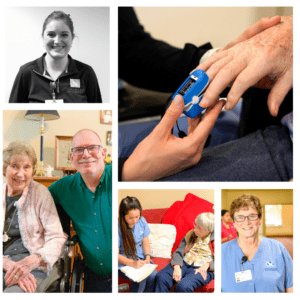This article was put together from a podcast recorded by Charles Bryce, CEO of Charlin Health Services. Charles is joined by Kathleen Fallon, a chaplain for Charlin Health. Listen to the podcast here.
The article focuses on mistakes families often make when they are overtaken by grief. These mistakes can be nearly impossible to see for someone who is deeply depressed or overtaken by their recent loss.
Families & Grief
The most common mistake made by grieving families after losing a loved one is setting a time frame for the grieving process. Grief has no timeline, so setting one often leads to people jumping back into a ‘regular’ life headfirst before they are ready. This goes doubly so for families with younger children–if a parent isn’t ready to go back to real life, how can their children be?
People often feel like they are rushed back into regular routines & life after a traumatic loss. This is because much of society isn’t compassionate about loss & associated grief. “Everyone losses people, get over it already!” can be a very general way of voicing the subconscious thoughts of our society.
But what if you can’t get over it? The best way to start a process of making sure you are ready to return to your routines is by gradually reintroducing things and checking in on yourself. A gradual rollout of work and social activities can reveal what a person is and isn’t capable of handling. Checking in on yourself at regular intervals allows you to see how you are feeling over time. Keeping a journal is a great way to see your progress.
Of course, however, extreme situations exist. In situations where depression or anger hits extreme levels, it is imperative to contact a healthcare professional. Letting depression or anger get out of control can lead to damaging or dangerous situations for you or your family.
Not Reaching Out for Help with Grief
Many younger families often try to deal with grief internally as a unit. This can often be a mistake as even large families won’t have the tools to deal with certain situations. It may be necessary for individuals to seek therapy, while group counseling may be a necessary option for families.
Mediation is an amazing tool for grieving families to use. Having an impartial third party guiding the conversations and healing process can mitigate grief-related anger that may make inter-family therapy impossible.
Great Days & Grief
Another common mistake made by grieving families or individuals is overreacting to having a great day. A great day can feel amazing in the middle of grief–everything seems to feel good or right again. This can be a mistake, however, as one good day will never alleviate the feelings associated with a loss.
One good day is usually not an example of total acceptance. Even multiple great days in a row doesn’t mean you are over the grief associated with a recent loss. Great days are often out of your control–external factors coming together that make you feel happy or satisfied. Great days spent alone may be a better indication of how you are coping with a loss, but take them with a grain of salt.
Grief takes most people a long time to fully process. Give yourself the time you need to recover and don’t just say you’re better after one great day.
Charlin Health Services
At Charlin Health Services we pride ourselves on honor, integrity, excellence, compassion, dignity, and trust. If you have any needs or questions about health services, hospice care, or other medical needs, please send us an email or give us a call.
About the Healthcare Expert
Kathleen Fallon started working in the healthcare industry in 1996. She started working in healthcare because she always wanted to help people with end-of-life care and associated difficulties. After years of extensive training in hospice care, Kathleen moved to Salt Lake City, UT where she was the assistant administrator of hospice services at a large assisted living facility.
While in Salt Lake City, Kathleen also oversaw the spiritual care unit. All of her work eventually lead to the establishment of an in-house hospice care unit at the assisted living facility. Kathleen eventually returned to Dallas, TX where she took up the role of chaplain at Charlin Health Services.



